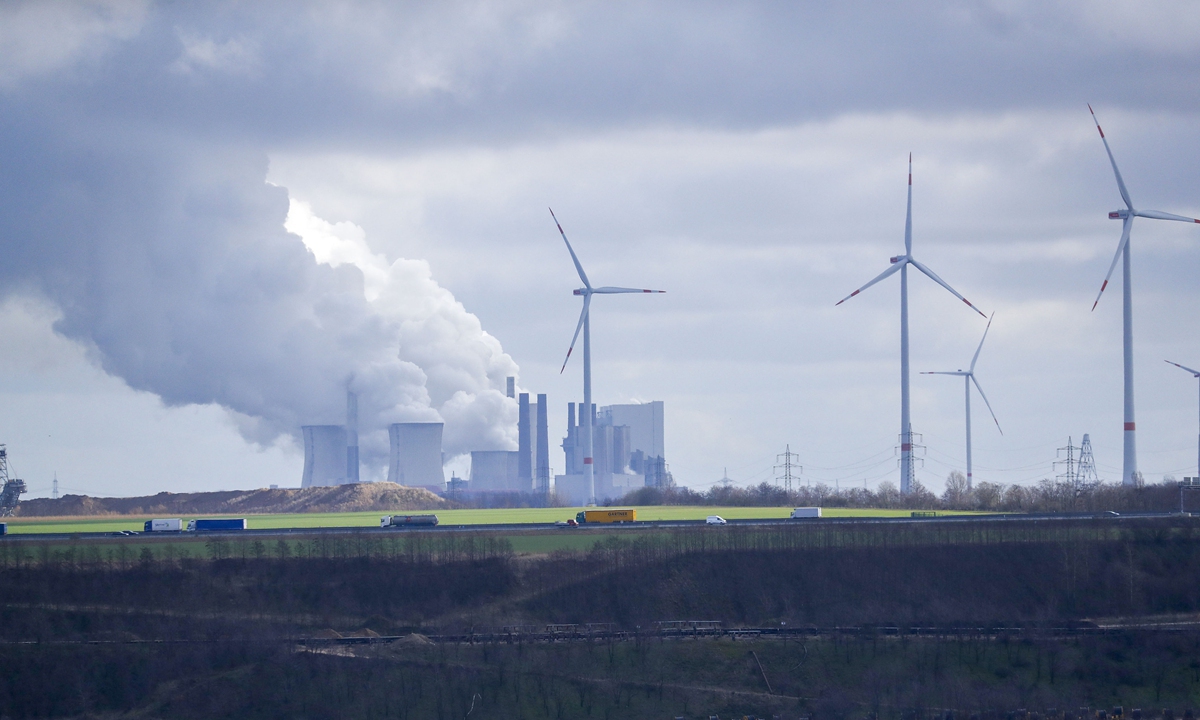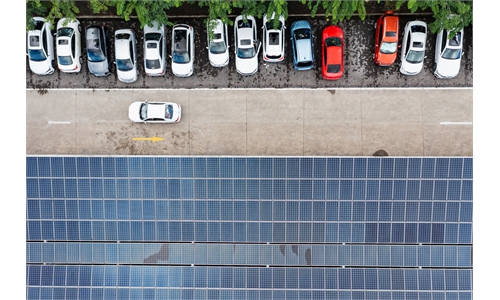
File Photo: VCG
While there may be a risk of increased competition between China and the EU in green industry development, this does not obscure the big picture of the two sides' objective needs and huge potential in green energy cooperation.
The EU on Tuesday agreed to new rules to bolster local green tech manufacturing, a move a Reuters report said was aimed at helping the bloc's green industry better compete with the US and Chinese rivals.
The bill, dubbed the Net-Zero Industry Act (NZIA), will be at the center of the EU's push to ensure the bloc is not only a global leader in cutting greenhouse gas emissions, but also in manufacturing the clean tech required. It will prioritize permitting and funding for the production of green products such as solar photovoltaic panels, wind turbines, batteries and heat pumps.
The EU's pursuit of its own green industry plans is a commendable step toward achieving its climate change and energy independence objectives. While it may send a strong signal about intensifying competition in the global clean industry, it is our sincere hope that the EU's efforts to achieve green industrial development do not adopt the protectionist approach often seen in the US.
There are reasons to be concerned about the EU's attitude toward China's green industry these days, as the new act follows discussions on imposing additional tariffs and other restrictive measures on Chinese photovoltaic products, as some voices within the EU have called for reducing "economic reliance" on Chinese supplies over the past year.
There have been media reports that the EU is planning to target Chinese solar companies with punitive measures, so as to protect EU companies from competition pressure. For instance, the Financial Times, citing EU officials, reported last month that after four European solar panel factories had shut or announced plans to do so, Brussels was considering emergency support measures, which could include an anti-dumping investigation against China - possibly leading to punitive tariffs - or incentives to national governments to keep plants going.
However, not everyone believes in the necessity for the EU to be engaged in trade disputes with China, which could be harmful to both sides. History has shown that protectionist measures are no solution to reviving the photovoltaic industry in any economy.
It is crucial for the EU to acknowledge that green products from China actually facilitate, rather than hinder, the EU's green industry goals. It is true that the EU imports a large amount of solar products from China and other countries, but a significant reason for this is the high cost of green production in Europe, which limits its own manufacturing capabilities.
It is China's substantial cost advantage in various green industries that has actually helped the EU's green industry development and enhanced the bloc's cost-efficiency in its transition toward a greener economy.
If the EU were to weaponize any of its laws and regulations to clamp down on green imports from China, the likely consequence would be a drag on its own green development.
China's willingness to act as a reliable and credible partner in supply and industry chain cooperation with the EU remains unwavering. The Chinese market and the stable and abundant supply of green intermediate products are of great significance to the EU's green transition. Also, the green industries in China and the EU have their own advantages, with high complementarities consolidating the foundation of bilateral green cooperation. In light of this, the EU's ambition to develop its green industry can be aligned with China-EU green cooperation.
For instance, EU carbon market construction has now entered the fourth stage, and China can learn from its experience and practice. In terms of multilateral coordination, China and the EU could enhance coordination in international platforms such as the United Nations Climate Change Conference and the Biodiversity Conference, and promote a global consensus on climate governance, contributing to the global green transition.
Therefore, despite the challenges of geopolitics and protectionism in the world, it is essential and beneficial for China and the EU to collaborate to create a favorable environment for green cooperation, instead of succumbing to the pitfalls of trade protectionism.



